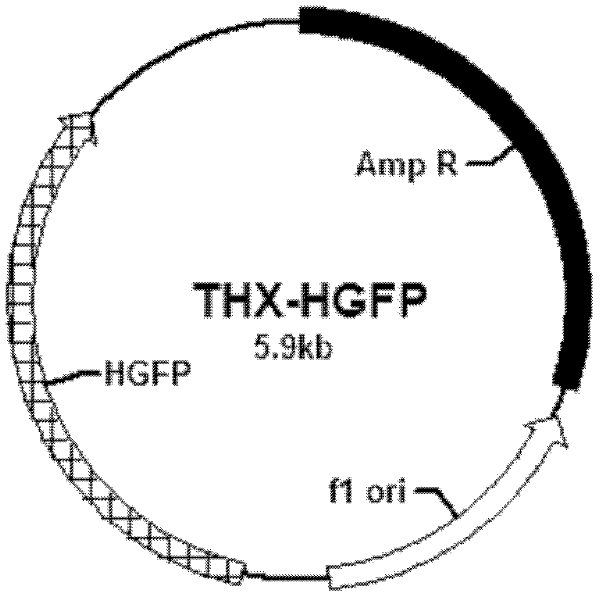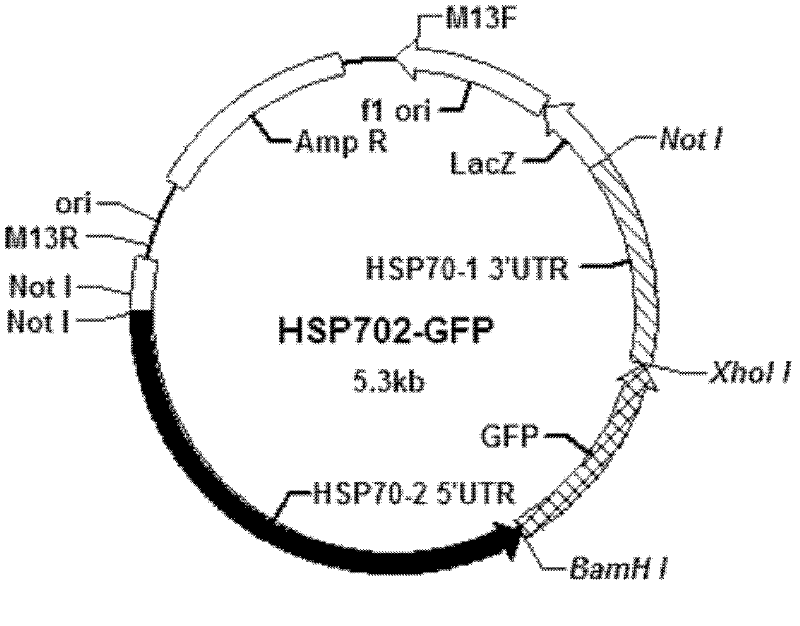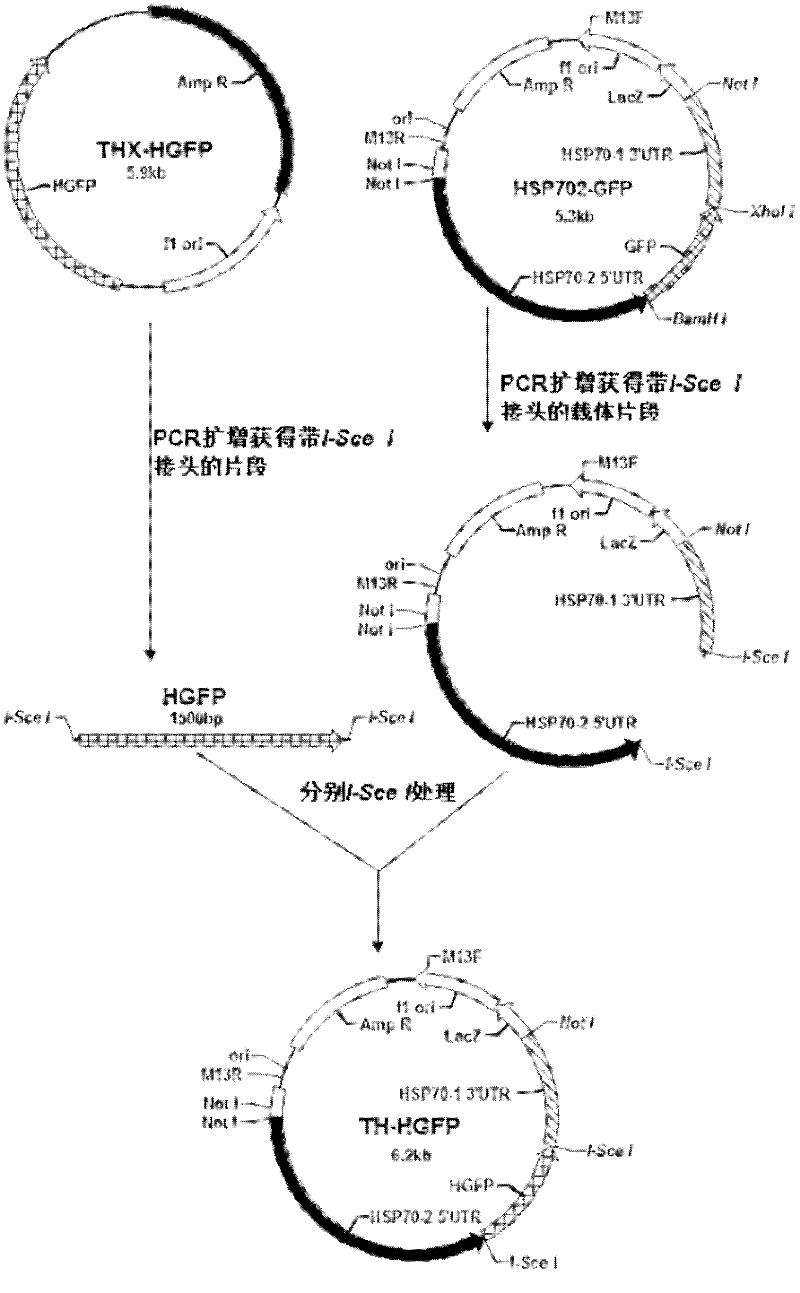Tetrahymena expression vector, construction method and application of one-step introduction of exogenous gene
A technology for expressing vectors and exogenous genes, applied in the field of constructing Tetrahymena rDNA expression vectors for eukaryotic proteins, the construction of Tetrahymena transgene expression vectors, and the field of Tetrahymena transgene expression vectors for exogenous genes, which can solve the problem of translation arrest And other issues
- Summary
- Abstract
- Description
- Claims
- Application Information
AI Technical Summary
Problems solved by technology
Method used
Image
Examples
Embodiment 1
[0243] Plasmid TH-HGFP construction, its steps are:
[0244] (1) The primers used in (a) are: Y-TGFP-I-SceI-41F: 5'GCCAG TAGGGATAACAGGGTAAT TCTCTGGAAAATAAAAAAGCTGGATCC 3′, Y-TGFP-I-SceI-42R: 5′GAGCTC TAGGGATAACAGGGT AAT AGATAAATTTTATATCAACTCGAGTCAGAA3′ (where TAGGGATAACAGGGTAAT for I-Sce I site). (b) The template used is the laboratory-constructed plasmid THX-HGFP. (c) PCR reaction system components: 5μl 10×Buffer (containing MgCl 2 ), 1μl dNTP (10mM), 1μl upstream primer (10μM), 1μl downstream primer (10μM), 1μl DNA, 0.5μl TITANIUM TM Taq DNA Polymerase, add double distilled water to 50μl. (d) The sample addition process was performed on ice. After the addition, the liquid in the tube was flicked evenly, centrifuged briefly, and then placed in a PCR instrument. (e) PCR reaction conditions: denaturation at 94°C for 5 min; cycle 35 times at 94°C for 30 s, 50°C for 30 s, and 72°C for 1 min; extension at 72°C for 10 min. (f) The Axygen Gel Recovery Kit was used to ...
Embodiment 2
[0253] Plasmid pD5H8-HGFP construction, its steps are:
[0254] (1) The primers used in (a) are: M13 forward and reverse primers. (b) The template used is the construction plasmid TH-HGFP. (c) PCR reaction system components: 5μl 10×Buffer (containing MgCl 2 ), 1μl dNTP (10mM), 1μl upstream primer (10μM), 1μl downstream primer (10μM), 1μl DNA, 0.5μl TITANIUM TM Taq DNA Polymerase, add double distilled water to 50μl. (d) The sample addition process was performed on ice. After the addition, the liquid in the tube was flicked evenly, centrifuged briefly, and then placed in a PCR instrument. (e) PCR reaction conditions: denaturation at 94°C for 5 min; cycle 35 times at 94°C for 30 s, 50°C for 30 s, and 72°C for 3.5 min; extension at 72°C for 10 min. (f) The Axygen Gel Recovery Kit was used to recover and purify the target DNA fragment of about 3400bp. (g) Digest the recovered target fragment with Not I at 37°C for 2 hours. The enzyme digestion system is: 5 μl 10× Buffer, 30 μ...
Embodiment 3
[0263] Plasmid TH-HIS-HGFP construction, its steps are:
[0264] (1) The primer used in (a) is: Y-th-2gfp(his)-69F: 5′CCCC AAGCTT TAGGGATAACAGGGTAATTCTCTG 3′, Y-th-2gfp(his)-70R: 5′ CCC AAGCTT ATGATGATGATGATGGTGCATTTTTGTAAACTTTTTAATTATTTGTT 3′ (where AAGCTT is the HindIII site). (b) The template used is the construction plasmid TH-HGFP. (c) PCR reaction system components: 5μl 10×Buffer (containing MgCl 2 ), 1μl dNTP (10mM), 1μl upstream primer (10μM), 1μl downstream primer (10μM), 1μl DNA, 0.5μl TITANIUM TM Taq DNA Polymerase, add double distilled water to 50μl. (d) The sample addition process was performed on ice. After the addition, the liquid in the tube was flicked evenly, centrifuged briefly, and then placed in a PCR instrument. (e) PCR reaction conditions: denaturation at 94°C for 5 min; cycle 35 times at 94°C for 30 s, 50°C for 30 s, and 72°C for 6.5 min; extension at 72°C for 10 min. (f) The Axygen Gel Recovery Kit was used to recover and purify the target D...
PUM
 Login to View More
Login to View More Abstract
Description
Claims
Application Information
 Login to View More
Login to View More - R&D
- Intellectual Property
- Life Sciences
- Materials
- Tech Scout
- Unparalleled Data Quality
- Higher Quality Content
- 60% Fewer Hallucinations
Browse by: Latest US Patents, China's latest patents, Technical Efficacy Thesaurus, Application Domain, Technology Topic, Popular Technical Reports.
© 2025 PatSnap. All rights reserved.Legal|Privacy policy|Modern Slavery Act Transparency Statement|Sitemap|About US| Contact US: help@patsnap.com



